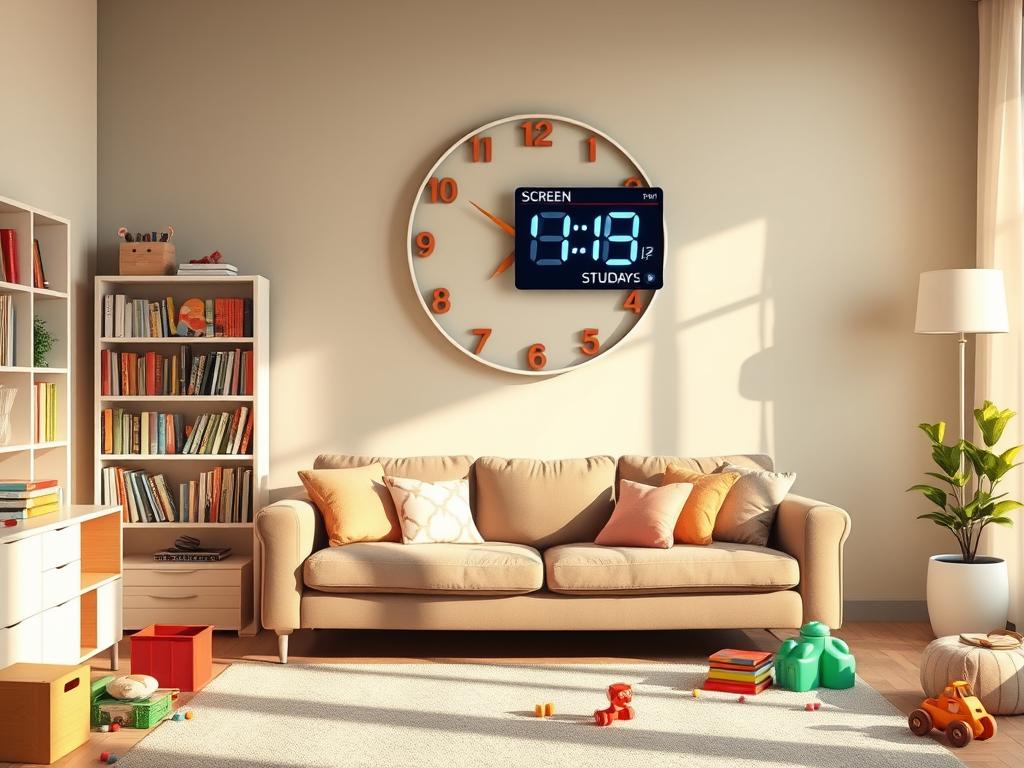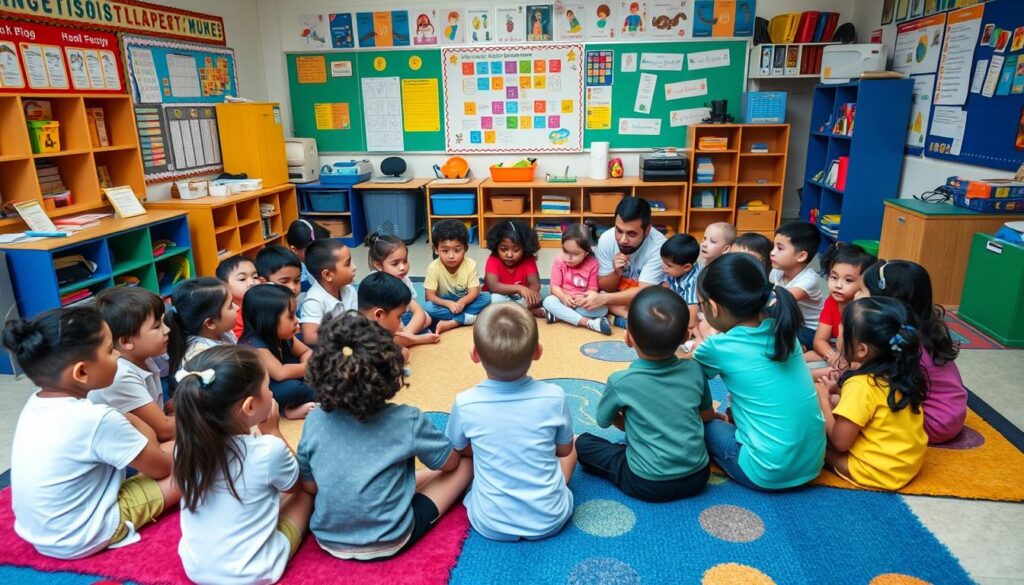In today’s digital age, screens are ubiquitous, and while they offer a wealth of information and entertainment, they can also pose challenges for parents striving to manage their children’s screen time. A family once faced this modern dilemma when their youngest child, fascinated by gaming, was spending up to 80 hours a week engrossed in virtual worlds. Concerned about the negative effects such excessive screen time could have on their child’s well-being, they decided to take action.
With determination, they implemented strategies that significantly reduced gaming hours down to a more manageable 5-10 hours a week. This transformation not only opened up time for meaningful family interactions but also allowed their eldest child to focus on honing skills in Adobe Creative Suite, while the youngest explored programming. These successes highlight the importance of effective screen time management and offer valuable parenting advice for reducing screen time.
In this article, we will share practical tips for parents on how to reduce children’s screen time while fostering a healthier lifestyle and promoting meaningful engagement in various activities. By setting clear limits, understanding the impacts of excessive screen time, and encouraging alternative pursuits, you can create a balanced environment for your children and themselves. Especially in a time when parental guidance is crucial, these screen time management tips will provide the foundation for nurturing better habits.
Key Takeaways
- Understanding the long-term impacts of excessive screen time is essential.
- Establishing clear screen time limits tailored to age groups promotes healthier habits.
- Diversifying activities with physical play, arts, and family games can enhance relationships.
- Being a role model in managing your own screen time encourages responsible behavior.
- Utilizing technology wisely, such as parental control apps, aids in creating safe digital experiences.
- Engaging in open communication with your child fosters collaboration in setting screen time guidelines.
Understanding the Impact of Excessive Screen Time
Excessive screen time can significantly affect children’s overall health, encompassing both physical and mental aspects. Scientific studies reveal alarming statistics about screen time and its consequences, shaping the experiences of young people today. As families increasingly embrace screens as a form of entertainment, recognizing the myriad effects of screen time becomes essential for promoting healthier lifestyles.
The Effects on Physical Health
Screen time has a direct correlation with various physical health issues in children. Studies indicate that preteens are spending an average of 5 ½ hours daily on screens, while teens are clocking approximately eight hours. With at least half of this time devoted to television, children face heightened risks of obesity and sedentary lifestyles. Evidence suggests that children exhibiting two or more hours of screen time per day are 42% more likely to be overweight. Limiting screen time is essential in implementing effective screen time reduction strategies that mitigate health risks.
The Effects on Mental Health
The mental health ramifications of excessive screen time are equally concerning. Increased exposure aligns with higher rates of anxiety and depression among children and adolescents. Lower school functioning and diminished self-esteem have also been associated with prolonged screen usage. The overstimulating nature of digital platforms leads to difficulties focusing on tasks that require sustained attention, exacerbating attention issues in children with ADHD. Addressing the effects of screen time on mental health highlights the need for families to prioritize balanced media consumption.
Screen Time and Sleep Disruption
Screen time significantly disrupts sleep patterns, often impairing both the quality and duration of sleep. Children exposed to screens, especially before bedtime, may experience difficulties in falling and staying asleep. Research shows that the exposure to screens can lead to reduced amounts of restorative sleep, which is crucial for emotional and cognitive health. This phenomenon underscores the importance of fostering healthy habits around screen time and sleep, ultimately supporting the well-being of children.

| Age Group | Recommended Screen Time | Consequences of Excessive Screen Time |
|---|---|---|
| Under 18 Months | No screen time except for video chatting | Risk of delayed language and social skill development |
| 18-24 Months | High-quality educational media with parental engagement | Limited cognitive and emotional development |
| 2-5 Years | No more than one hour per day | Increased risk of behavioral problems and poor vocabulary |
| 5 Years and Older | No more than two hours per day | Higher likelihood of mental health issues and academic challenges |
Setting Clear Screen Time Limits
Establishing defined screen time limits is essential for managing children’s technology use. By understanding recommendations by age group and creating a consistent screen time schedule, parents can guide their children toward healthier habits.
Recommendations by Age Group
The American Academy of Pediatrics provides specific guidelines regarding screen time:
- Under 2 years: No screen time, except for video chatting to connect with family.
- Ages 2 to 5: Limit to one hour of high-quality programming per day.
- Ages 6 and up: Parents should set consistent screen time limits tailored to their child’s needs and lifestyle.
By promoting healthy practices at a young age, parents can encourage their children’s understanding of when and how to engage with screens.
Creating a Screen Time Schedule
One effective way to limit screen time is by establishing a clear screen time schedule. Here are some practical ways to limit screen time:
- Designate specific times for screen use during the day, helping create a routine.
- Use rewards to incentivize good behavior; for instance, offer additional screen time as a reward for chores done well.
- Avoid debates over screen time; clear and consistent rules lead to smoother compliance.
Equipping children with the necessary tools to engage with screens responsibly fosters an understanding of moderation and personal accountability. As screen time becomes more regulated, children are more likely to embrace non-screen activities and balance their daily routines.

Encouraging Alternative Activities
Promoting alternative activities presents an effective strategy for reducing screen time. Emphasizing outdoor play and physical activity serves as a foundation for healthy habits among children. Engaging in these activities not only fosters enjoyment but also supports their physical and mental development. Various options, including hiking, cycling, and camping, facilitate exploration of the great outdoors while encouraging family involvement.
Outdoor Play and Physical Activity
Getting children involved in outdoor play is crucial for their overall health. Studies indicate that children should aim for at least 60 minutes of moderate to vigorous activity daily. This can encompass sports, playground games, or family walks. The benefits are profound; regular outdoor play enhances children’s attention spans and executive function. Parents can discover exciting outdoor sports for families that nurture teamwork and cooperation.
Arts and Crafts to Inspire Creativity
Incorporating arts and crafts provides a fantastic outlet for creativity while promoting screen-free entertainment. Activities like painting, sculpting, or even simple DIY projects allow children to express themselves and develop fine motor skills. As digital distractions increase, arts and crafts emerge as valuable alternatives that can captivate children’s attention and encourage them to engage in productive activities.
Family Game Nights for Quality Time
Establishing family game nights is an excellent way to strengthen familial bonds. These gatherings promote communication, teamwork, and critical thinking skills. By replacing digital diversions with board games or card games, families can create lasting memories and enjoy each other’s company. Regular family game nights contribute to healthy screen time habits for children, ensuring that they develop socially and emotionally in a nurturing environment.

Being a Role Model for Healthy Habits
Parents play a crucial role in shaping their children’s habits. By acting as a role model for healthy habits, parents can significantly influence their kids’ screen time behaviors. To foster a balanced lifestyle, it is important to limit your own screen time. Setting a personal limit of no more than two hours a day demonstrates to children that responsible screen usage is attainable.
Limit Your Own Screen Time
When parents consciously limit their own screen time, they send a powerful message. Children learn by example, so seeing adults engage in healthier technology habits encourages them to do the same. This aligns with effective parenting advice for reducing screen time. Tracking your screen use and making adjustments when necessary can enhance family time and promote healthier habits.
Engage in Screen-Free Activities Together
Creating opportunities for screen-free interactive moments strengthens family bonds. Engaging in screen-free activities not only counters digital consumption but also provides shared experiences. Families can partake in various activities such as sports, reading, crafting, and playing games. These moments not only replace screen time but also cultivate an environment where children can thrive. Establishing routines that include activities away from screens nurtures a healthier, more active lifestyle for everyone involved.
For further ideas on incorporating exercise and family time in a busy schedule, consider adding quick workouts or family activities to your daily routine. Check out this resource for more tips on making these activities enjoyable and sustainable.
Utilizing Technology Wisely
Today’s digital landscape presents both challenges and opportunities for parents managing their children’s screen time. Utilizing technology wisely includes implementing tools and resources that enable families to enjoy safe and enriching experiences. A powerful approach involves using parental control apps, which help set specific limits on device usage, ensuring children are engaged with appropriate and beneficial content.
Using Parental Control Apps
Parental control apps serve as effective screen time management tips for families. They allow parents to monitor usage, filter out inappropriate content, and set time limits tailored to their child’s age and developmental needs. The American Academy of Pediatrics suggests limiting screen time to one hour for kids aged 2-5, emphasizing the importance of fostering healthy habits from an early age.
Choosing Educational Content
Choosing educational content can transform screen time into a valuable learning opportunity. Parents can curate programs that promote creativity, critical thinking, and problem-solving skills. Quality content encourages children to comprehend the difference between real and edited material they encounter online. Alongside this, it remains essential to engage in discussions about media literacy, helping children interpret what they see and experience on screens.
Communicating With Your Child
Effective communication is vital when managing screen time. Parents should prioritize discussing the reasons for limits, emphasizing the significance of achieving a healthy balance in their children’s lives. By openly discussing reasons for limits such as promoting better sleep habits and physical health, parents can help kids understand the rationale behind these guidelines, making it easier for them to accept these necessary restrictions.
Discussing the Reasons for Limits
When parents explain the potential negative effects of excessive screen time, such as weight gain or sleep disruptions, children are more likely to appreciate the importance of these boundaries. Research highlights that children are affected when parents themselves are excessively engaged with their devices, especially in family settings. This underscores the need for families to prioritize tech-free moments together, allowing for more meaningful interactions and activities that reinforce positive habits.
Involving Children in Setting Guidelines
Incorporating children in decisions about screen time empowers them and promotes a sense of responsibility. Allowing them to participate in involving children in guidelines fosters cooperation and enhances the parent-child relationship. Parents can utilize this collaborative approach to create rules that resonate with the family’s values while ensuring fun alternatives are available nearby. By actively engaging with their children in this process, they also enhance their chances of adhering to the established limits, supported by parenting advice for reducing screen time.











